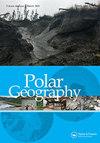‘Road of life’: changing navigation seasons and the adaptation of island communities in the Russian Arctic
IF 1.6
Q3 GEOGRAPHY, PHYSICAL
引用次数: 6
Abstract
ABSTRACT Adaptation of remote island communities in the Russian European Arctic to dramatic socioeconomic changes has been intensified by the impacts of climate changes in navigation seasons. Both the stability and duration of winter and summer navigation seasons and the start of the rasputitsa season, a shoulder period between the first two, are becoming more unpredictable and jeopardizing local mobility options. The ability to commute between neighboring settlements is an important aspect of island communities’ viability. Local mobility depends on well-functioning ice roads during wintertime, tugboats during the raputitsa season and on passenger vessels or smaller boats during summer navigation. To examine whether and how the island population of the Arkhangelsk region adapts to changing conditions and what factors shape adaptation options, we apply a community-based adaptation approach. The results from qualitative interviews with 32 residents and relevant stakeholders indicate that further development of the island communities will rely on sufficient mobility options. Incorporation of climate prognoses and local knowledge can improve the planning of mobility measures. Current and future community adaptation is challenged by out-migration, unpredictability in the rasputitsa season and lack of investment in island development.“生命之路”:俄罗斯北极地区不断变化的航行季节和岛屿社区的适应
俄罗斯欧洲北极地区偏远岛屿社区对剧烈社会经济变化的适应已经受到航行季节气候变化的影响。冬季和夏季航行季节的稳定性和持续时间,以及位于前两个季节之间的rasputitsa季节的开始,都变得越来越难以预测,并危及当地的交通选择。在邻近住区之间通勤的能力是岛屿社区生存能力的一个重要方面。当地的交通取决于冬季运行良好的冰路,raputitsa季节的拖船,夏季航行时的客船或小船。为了研究阿尔汉格尔斯克地区的岛屿人口是否以及如何适应不断变化的条件,以及哪些因素决定了适应方案,我们采用了基于社区的适应方法。对32名居民和相关利益攸关方进行定性访谈的结果表明,岛屿社区的进一步发展将依赖于充分的流动选择。结合气候预测和当地知识可以改善交通措施的规划。目前和未来的社区适应受到外来移民、rasputitsa季节的不可预测性以及缺乏对岛屿发展的投资的挑战。
本文章由计算机程序翻译,如有差异,请以英文原文为准。
求助全文
约1分钟内获得全文
求助全文
来源期刊

Polar Geography
GEOGRAPHY, PHYSICAL-
CiteScore
5.30
自引率
0.00%
发文量
13
期刊介绍:
Polar Geographyis a quarterly publication that offers a venue for scholarly research on the physical and human aspects of the Polar Regions. The journal seeks to address the component interplay of the natural systems, the complex historical, political, economic, cultural, diplomatic, and security issues, and the interchange amongst them. As such, the journal welcomes comparative approaches, critical scholarship, and alternative and disparate perspectives from around the globe. The journal offers scientists a venue for publishing longer papers such as might result from distillation of a thesis, or review papers that place in global context results from coordinated national and international efforts currently underway in both Polar Regions.
 求助内容:
求助内容: 应助结果提醒方式:
应助结果提醒方式:


